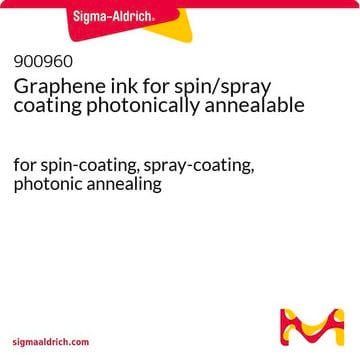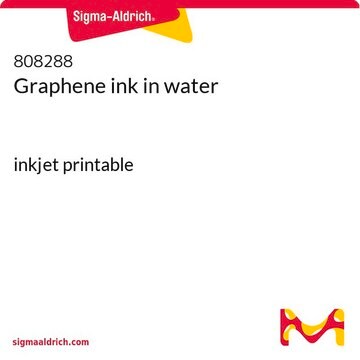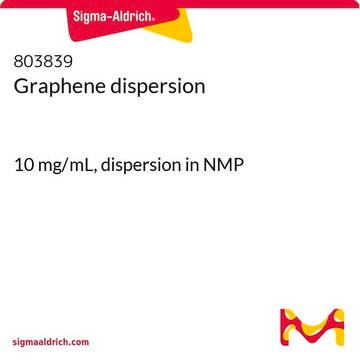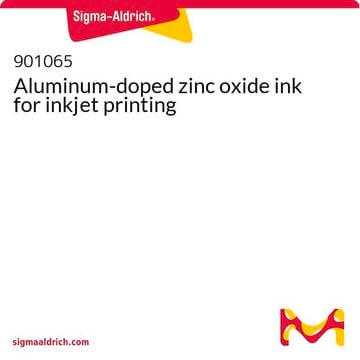793663
Graphene ink
for inkjet printing, with ethyl cellulose in cyclohexanone and terpineol, inkjet printable
Sinónimos:
inkjetting ink, conductive ink
About This Item
Productos recomendados
formulario
liquid
características de los productos alternativos más sostenibles
Design for Energy Efficiency
Learn more about the Principles of Green Chemistry.
sustainability
Greener Alternative Product
concentración
2.4 wt. % (solid (graphene and ethyl cellulose) in cyclohexanone/terpineol)
resistividad
0.003-0.008 Ω-cm (thermally annealed 250°C for 30 minutes, film thickness >100 nm)
tamaño de partícula
≤3 μm
tensión superficial
30 dyn/cm
viscosidad
8-15 mPa.s(30 °C)
bp
213-218 °C (Terpineol)
densidad
0.9375 g/mL at 25 °C
categoría alternativa más sostenible
cadena SMILES
OC(C1=C2C(C3=C(C4=C(C5=C(C6=C(C7=C(C8=C(C9=C(C%10=C(C%11=C(C%12=C(C%13=C(C%14=C(C%15=CC=C%16O)C%16=C%17)C%17=C%18)C%18=C%19C(O)=O)C%19=C%20)C%20=C%21O)C%21=C%22)C%22=C%23)C%23=C%24O)C%24=C%25)C%25=C%26C(O)=O)C%26=C%27)C%27=C2)=C%28C%29=C(C%30=C%31C%28=C%3
¿Está buscando productos similares? Visita Guía de comparación de productos
Categorías relacionadas
Descripción general
Aplicación
Curing Condition: 250-350°C, 20-30min
This ink was tested on polyimide and silicon dioxide substrates.
Otras notas
Información legal
Palabra de señalización
Danger
Frases de peligro
Clasificaciones de peligro
Acute Tox. 4 Dermal - Acute Tox. 4 Inhalation - Acute Tox. 4 Oral - Eye Dam. 1 - Skin Irrit. 2 - STOT SE 3
Órganos de actuación
Respiratory system
Código de clase de almacenamiento
10 - Combustible liquids
Clase de riesgo para el agua (WGK)
WGK 2
Punto de inflamabilidad (°F)
143.6 °F
Punto de inflamabilidad (°C)
62 °C
Certificados de análisis (COA)
Busque Certificados de análisis (COA) introduciendo el número de lote del producto. Los números de lote se encuentran en la etiqueta del producto después de las palabras «Lot» o «Batch»
¿Ya tiene este producto?
Encuentre la documentación para los productos que ha comprado recientemente en la Biblioteca de documentos.
Los clientes también vieron
Artículos
Functional materials for printed electronics applications enable flexible displays, RFID tags, and biomedical sensors.
Graphene is a unique two-dimensional (2D) structure of monolayer carbon atoms packed into a dense honeycomb crystal that has attracted great interest due to its diverse and fascinating properties.
Since its discovery little more than a decade ago,1 the two-dimensional (2D) allotrope of carbon—graphene—has been the subject of intense multidisciplinary research efforts.
Graphene's unique properties spark interdisciplinary interest; its honeycomb structure offers electrical, optical, and mechanical marvels.
Nuestro equipo de científicos tiene experiencia en todas las áreas de investigación: Ciencias de la vida, Ciencia de los materiales, Síntesis química, Cromatografía, Analítica y muchas otras.
Póngase en contacto con el Servicio técnico

